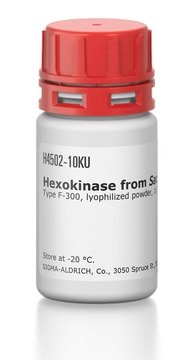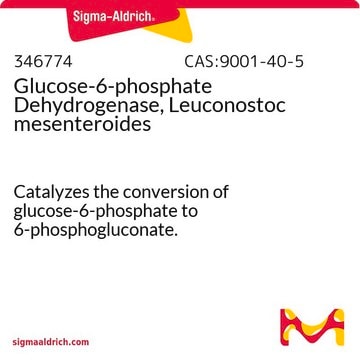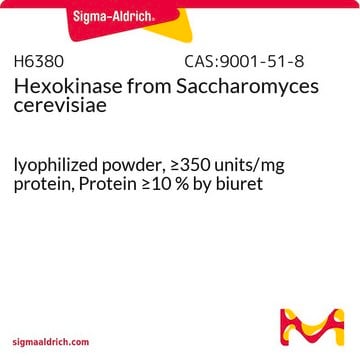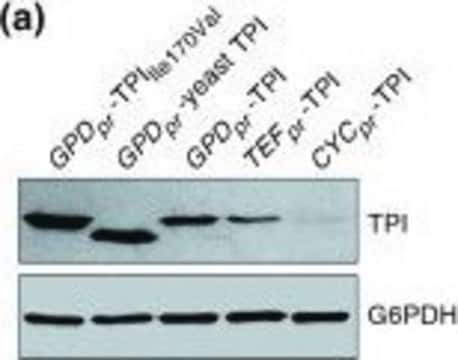G5760
Glucose-6-phosphate Dehydrogenase from Leuconostoc mesenteroides
Type XXIII, ammonium sulfate suspension, 550-1,100 units/mg protein (biuret), ≥2.0 mg/mL Biuret
Synonym(s):
G-6-P-DH
About This Item
Recommended Products
biological source
bacterial (Leuconostoc mesenteroides)
Quality Level
type
Type XXIII
form
ammonium sulfate suspension
specific activity
550-1,100 units/mg protein (biuret)
mol wt
54 kDa
concentration
≥2.0 mg/mL Biuret
foreign activity
6-Phosphogluconic dehydrogenase, hexokinase, NADH oxidase and NADPH oxidase ≤0.005%
PGI ≤0.01%
storage temp.
2-8°C
Looking for similar products? Visit Product Comparison Guide
Related Categories
General description
Glucose-6-phosphate dehydrogenase (G6PD) is found in the cytoplasm of all cells. The G6PD enzyme is encoded by the Gd gene, located on the long arm of the X chromosome.Glucose-6-phosphate Dehydrogenase (G6PD) from Leuconostoc mesenteroides catalyzes the oxidation of glucose 6-phosphate in the presence of nicotinamide adenine dinucleotide (NAD+) or nicotinamide adenine dinucleotide phosphate (NADP+). It corresponds to a molecular weight of 54 kDa and exists as a homodimer.
Application
- as a component of reaction mixture for assaying mannose- and glucose-6-phosphate activity
- as a component of reaction mixture in the nevirapine inhibition studies in human hepatic microsomes
- in the glucose-phosphorylating activity of chloroplast extracts
- as a model to test the effect of seed protein fractions on enzyme protection during dehydration.
- in assays for nicotinamide adenine dinucleotide and tissue pyridine nucleotides.
Biochem/physiol Actions
Unit Definition
Physical form
Signal Word
Danger
Hazard Statements
Precautionary Statements
Hazard Classifications
Resp. Sens. 1
Storage Class Code
11 - Combustible Solids
WGK
WGK 3
Flash Point(F)
Not applicable
Flash Point(C)
Not applicable
Personal Protective Equipment
Certificates of Analysis (COA)
Search for Certificates of Analysis (COA) by entering the products Lot/Batch Number. Lot and Batch Numbers can be found on a product’s label following the words ‘Lot’ or ‘Batch’.
Already Own This Product?
Find documentation for the products that you have recently purchased in the Document Library.
Customers Also Viewed
Articles
Instructions for working with enzymes supplied as ammonium sulfate suspensions
Protocols
To measure glucose-6-phosphate dehydrogenase activity, beta-nicotinamide adenine dinucleotide phosphate is used in a spectrophotometric rate determination assay at 340 nm.
Our team of scientists has experience in all areas of research including Life Science, Material Science, Chemical Synthesis, Chromatography, Analytical and many others.
Contact Technical Service










